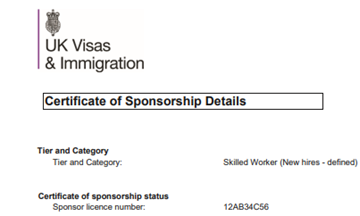Immigration Skills Charge: A Guide for Employers
Everything Employers Need to Know about the UK Immigration Skills Charge in 2025

The Immigration Skills Charge (ISC) is a key part of the UK’s immigration system, designed to encourage employers to invest in developing skills within the UK workforce while enabling them to hire skilled workers from abroad. If your organisation holds a Home Office sponsor licence and employs workers through the UK Skilled Worker visa or certain other visa categories, understanding the ISC is crucial to maintaining compliance and budgeting effectively.
This guide provides a comprehensive overview of the Immigration Skills Charge, including who needs to pay, how much it costs, and how it impacts businesses in 2025.
What is the Immigration Skills Charge (ISC)?
The Immigration Skills Charge is a levy that employers in the UK must pay when sponsoring workers from outside the UK through specific visa categories, such as the Skilled Worker Visa and certain Global Business Mobility routes. Introduced in 2017, the charge aims to:
- Reduce reliance on migrant labour by encouraging investment in training and upskilling the UK workforce.
- Generate funds to support apprenticeships and other skills initiatives.
Who Needs to Pay the ISC?
Employers must pay the ISC if:
- They are sponsoring a worker under the Skilled Worker Visa or certain subcategories of the Global Business Mobility Visa (e.g., Senior or Specialist Worker).
- The worker is applying for a visa to work in the UK for six months or more.
Exemptions
The Immigration Skills Charge does not apply to:
- Workers applying for a visa for less than six months.
- PhD-level roles (RQF Level 8).
- Workers on the Intra-Company Graduate Trainee Visa.
- Applicants switching to a Skilled Worker Visa from within the UK who were previously on a student or other non-work visa.
How Much Does the Immigration Skills Charge Cost?
The Immigration Skills Charge fee varies depending on the size of your organisation and the length of employment specified on the worker’s Certificate of Sponsorship (CoS).
| Business Size | Per Year Fee | Maximum Fee (5 years) |
|---|---|---|
| Small or Charitable Sponsors | £364 | £1,820 |
| Medium or Large Sponsors | £1,000 | £5,000 |
Who Qualifies as a Small or Charitable Sponsor?
You qualify if at least two of the following apply:
- Your annual turnover is £10.2 million or less.
- Your total assets are £5.1 million or less.
- You have 50 employees or fewer.

When and How to Pay the ISC
The ISC is paid at the time you assign a Certificate of Sponsorship (CoS) to a worker. Payment is made through the Sponsor Management System (SMS) when assigning the CoS.
Key Points to Remember:
- The full Immigration Skills Charge amount for the duration of the visa must be paid upfront.
- If the worker leaves before the visa expires, you may be eligible for a partial refund of the unused Immigration Skills Charge amount.
Practical Implications of the Immigration Skills Charge
The ISC has financial implications for businesses of all sizes. For small organisations, the costs can add up quickly, especially when sponsoring multiple workers. Larger organisations may face significant expenses for long-term or large-scale hiring needs.
To manage these costs effectively:
- Plan Ahead: Include the ISC in your recruitment budget.
- Evaluate Long-Term Needs: Consider how long you will need the worker and whether they could transition to a different visa or status in the future.
- Seek Exemptions Where Possible: Ensure you understand the roles and circumstances that qualify for ISC exemptions.
The ISC and Compliance
Failure to pay the Immigration Skills Charge or incorrect payment can lead to serious consequences, including:
- The rejection of visa applications.
- Potential fines or penalties during Home Office compliance audits.
- Negative impacts on your sponsor licence rating.
Maintaining compliance with ISC requirements is essential for preserving your ability to sponsor skilled workers.

How Immtell Can Help
Navigating the Immigration Skills Charge can be complex, especially when combined with other sponsor licence obligations. At Immtell, we provide expert support to help employers:
- Understand and calculate ISC costs.
- Ensure compliance with payment and reporting requirements.
- Explore visa options to minimise costs and maximise business efficiency.
Our tailored guidance ensures you stay on the right side of compliance while meeting your recruitment needs effectively.
Final Thoughts
The Immigration Skills Charge is a key consideration for any UK employer hiring international talent. Understanding when and how to pay the ISC, as well as planning for its financial impact, is essential for maintaining compliance and supporting your business’s growth.


Take Control of Your Sponsor Licence Obligations
Need assistance navigating the Immigration Skills Charge and managing your sponsor licence duties? Immtell’s experts are here to provide clear, actionable guidance tailored to your business needs.
Need assistance navigating the Immigration Skills Charge and managing your sponsor licence duties? Immtell’s experts are here to provide clear, actionable guidance tailored to your business needs.









